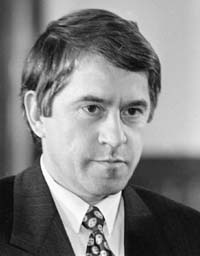Government and National Bank to maintain exchange rate in the interests of exporters

Prime Minister Anatoly Kinakh made a long-awaited statement at the end of the week before last on the government exchange rate policy. “There will be no major changes,” the premier says, “but the NBU and the government should take into account the interests of exporters.” Exporters are known to be interested in the hryvnia’s devaluation, which has allowed them to cash on the exchange rate difference in the past few years. The currency market is currently a bear one with respect to the dollar: the hryvnia has been continuously strengthening its position for the first six months of this year. But now that the government includes representatives of the industrial managers’ interests the financial circles are rife with rumors about a likely change in exchange rate dynamics.
Banking circles began speculating on possible changes in the government exchange policy immediately after the new premier was appointed. The point is that just a few months ago Mr. Kinakh, then president of the Ukrainian Union of Industrialists and Entrepreneurs (UUIE), quite scathingly criticized NBU tactics, demanding a smooth devaluation of the hryvnia rate in the interests of exporters. At that time, addressing a UUIE congress in Kyiv’s Ukrayina Palace, President Leonid Kuchma also backed Mr. Kinakh. Yet, they managed to pacify the agitated market. After becoming premier, Mr. Kinakh held a closed-door meeting with National Bank top executives, where the government and the NBU agreed to jointly monitor the effectiveness of their foreign exchange policy. “This monitoring should focus on the effect the exchange rate has on exports, the domestic market, i.e., imports, the inflation rate, and, in general, on the changing structure of the gross domestic product,” Mr. Kinakh says.
It thus becomes obvious that the government is playing an increasing role in shaping foreign exchange policy. On the other hand, Mr. Kinakh admits now that the stable growth of exports in the first six months does not give him reason to criticize the NBU. What can really stir up debate in the immediate future is the mandatory 50% sale of hard currency earned by exporters. In the premier’s opinion he expressed after the NBU meeting, “The nation’s currency’s stability should be based, first of all, on economic competitiveness, not on some or other mechanisms of currency regulation.”
Currency rate variability is under the jurisdiction of the NBU Supervisory Board. But board members themselves are not yet inclined to see the 50% sale canceled, although they admit this is a pressing problem. “What is more important at this stage is to preserve a certain strategy, a certain guarantee that the country will always have hard currency coming to the currency market, rather than to bring down the mandatory sale percentage for tactical considerations to balance the bottom line,” thinks Ihor Yushko, member of the NBU Supervisory Council.
Bankers, whose clients include industrial mammoths, admit that exporters no longer even dream of a lucrative devaluation of the hryvnia rate. The question is at least to keep the current exchange rate situation intact. Should the hryvnia continue its precipitate upward movement, the resulting losses could force industrialists to retaliate. It is evident today that the powerful export lobby is only waiting for an occasion to push all the buttons to influence the country’s leadership. The imposition of the import VAT by Russia on July 1 might be the first such signal. This will undoubtedly affect Ukrainian exports to that country. In addition, for example, Vadym Pushkariov, chairman of the board of Finances and Credit, notes the dwindling hard currency deposits in the accounts of chemical enterprises due to a worsened price situation on foreign markets. “It is not excluded that the exporters of chemical products will lobby and pressure the NBU in order to have their hryvnia equivalent unchanged,” the banker supposes.
Yet, the government, NBU, and commercial banks are positively forecasting today that the current hryvnia revaluation trend will last until August, when oil traders will begin their traditional agitation to stock up on energy resources anticipating fall cold spells. Banker obviously find it hard today to identify the so-called exchange rate threshold, i.e., the dollar rate reduction limit. Mykhailo Prianychnykov, chief of the resources regulation department at VABank, does not think the rate will drop below 5.36. In his opinion, a different scenario, although possible, would be too painful for exporters.
Knowing the well-established links between the current premier and managerial corps, it is easy to guess that Mr. Kinakh will be the first to receive information about the discontent of chemical and metallurgical producers. They control over half Ukrainian exports, which in turn accounts for 63% of this country’s GDP. And this means it is impossible to ignore the industrialists’ claims. The bankers are so far calming themselves that the advent of a new person, even a prime minister, cannot immediately tell on this country’s foreign exchange policy. Moreover, the arguments in favor of devaluation do not look convincing. The inflow of hard currency considerably exceeds the expenses related to foreign debt service and import operations.
It is not ruled out that the current rumors about possible modifications in the government exchange rate policy will remain nothing but idle talk. If, in response to the forecast income losses suffered by the exporters, the government initiates new tax concessions, devaluation will be struck off the agenda. But if the Cabinet of Ministers and parliament turn a blind eye to the significant reduction of exports to Russia and a series of anti-dumping suits against steel- makers, this will almost inevitably revive the debate on a lifesaving devaluation.






